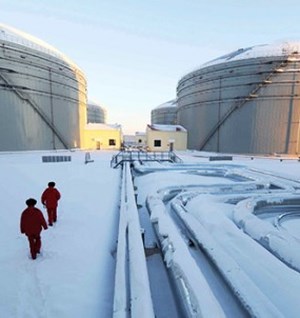Russian oil shipped to parts of Europe halted due to contamination
BELARUS and WARSAW (Bloomberg) -- Russian oil exported to parts of Europe were halted after customers complained of contamination in the crude, adding another disruption to the global oil market and pushing prices in London above $75/bbl.
Poland, which receives oil through a northern section of the giant Druzhba pipeline, stopped Russian imports, saying shipments have become contaminated by organic chlorides. The halted section passes from Poland to Germany. Barrels were still flowing through a separate spur feeding several nations in eastern and central Europe with one buyer saying crude on that line continues to meet operational standards.
“The level of contamination could cause physical damage to refining facilities,” Poland’s pipeline operator PERN SA said late Wednesday. Organic chlorides become hydrochloric acid during the refining process, damaging the plants.
The outage, which is very unusual, comes at a time when the global oil market is already short of supply of crude of similar quality to Urals. The combined impact of U.S. sanctions on Iran and Venezuela, OPEC+ production cuts, and lower-than-expected output in Mexico has reduced worldwide shipments of denser, medium-heavy crude with high sulfur content.
Brent crude passed $75/bbl for the first time since October. It was trading up 0.5% at $74.96/bbl at 4:19 p.m. in London.
Short supply
Organic chlorides are not naturally occurring and are used in upstream processes to boost output, “but must be removed before bringing crude parcels to market,” said Amrita Sen, chief oil analyst at consultant Energy Aspects Ltd.
The halted part of the pipeline delivered about 730,000 bpd of crude to Germany and Poland in the final five months of last year, Russian Energy Ministry data show. Flows to Germany via the link have also stopped, according to a person familiar with the matter.
Mol Nyrt., which has refineries in Hungary and Slovakia, said it’s monitoring crude as it flows through the southern section of the pipeline and that, so far, the oil it has observed has met the company’s required operation standards.
In a sign that oil traders are scrambling for replacement barrels, the price difference between Brent crude for immediate delivery and the six-month forward contract surged to as much as $3.25/bbl on Thursday, the widest spread in about five years. As much as 1.5 MMbopd are at risk, according to data compiled by Bloomberg.
The contamination issues emerged late last week when Belarus, which sits between Russia and Poland, complained that its refineries could suffer damage. The pollution issue also affected flows via the port of Ust-Luga on Russia’s Baltic Sea coast, a person familiar with the matter said Wednesday. Poland’s biggest refiners, Grupa Lotos SA and PKN Orlen SA, said Thursday their productivity won’t be affected.
The Druzhba pipeline is a vital source of crude for Europe’s refineries handling roughly 1 MMbpd. It divides in Belarus, with the southern section supplying refineries in countries including the Czech Republic, Slovakia and Hungary.
Russia also exports from the port of Primorsk in the Baltic Sea, and Novorossiysk in the Black Sea. There’s no sign at this time that those shipments have been affected.
Technical issues
Supplies of oil and refined products to the Polish market will be maintained from stockpiles until the situation is resolved, according to PERN, the pipeline operator. If the halt is prolonged, the refiners will import crude through the Gdansk port on the Baltic Sea, it said.
PKN Orlen said it anticipates the halt lasting one or two weeks. Issues with the quality of Russian crude supply are “technical” and should be resolved in “near future,” Russian Deputy Prime Minister Dmitry Kozak said Thursday.
Belarus told PERN about problems with the oil quality on April 19 and halted its exports of refined fuel. The country, which profits from processing Russian crude, is embroiled in a fight with its larger neighbor over an energy tax regime that it says could deprive its budget of billions of dollars.
Seaborne option
Amid friction over Russia’s push for deeper economic and political integration, Belarusian President Alexander Lukashenko threatened earlier this month to close pipelines transporting Russian oil across his country for maintenance. Russia has said it may increase oil exports via sea if the Druzhba pipeline closes.
A spokesman for Russian pipeline operator Transneft PJSC didn’t immediately respond to a request for comment. Ukraine’s state-run operator of oil pipeline and transit said in a Facebook chat that flows are currently uninterrupted.
“There has been no improvement in the quality of Russian crude, it still does not correspond to the norms,” Marina Kostiuchenko, a spokeswoman for Belarusian state petrochemicals company Belneftekhim said by phone from Minsk. "Acceptable quality norms are exceeded several times, the situation has not improved."



